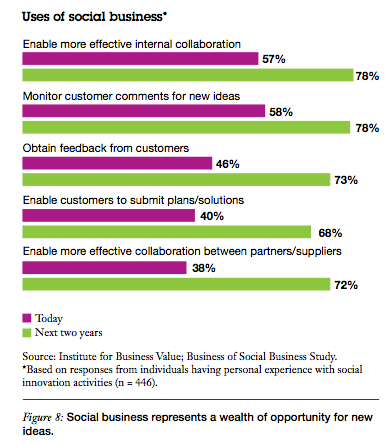In the past few years, social media and changes in cultural behavior have had an enormous influence – not just on the American presidential elections but on our private lives, politics and the whole of society.
It has become clear that these changes are also highly significant for businesses and for the economy in general. We therefore speak not only of “social media” but of “social business”, too. A new international study published by the IBM Institute for Business Value gives insight into the opportunities and challenges presented by social business.
The institute surveyed over 1,100 people and conducted around 25 detailed interviews with leading organizations, with the aim of ascertaining how social business approaches can be utilized to generate added value for businesses.
The surveys clearly demonstrated that social business is about much more than simply having a presence on the major social networks. Social business is about embedding the appropriate technologies and behaviors in internal business processes, in communication with customers, and in collaborations with external organizations. This can increase employee productivity, improve customer service and accelerate innovation.
According to the study, 46 percent of organizations have increased their investment in social business, and 62 percent plan to invest more over the next three years. These investments are effected by many different corporate divisions. Obviously, social media marketing (67 percent) and public relations (54 percent) play a major part in this. However, other corporate functions are also gaining in significance. In the next two years, the greatest growth in adoption will be in customer service (from 38 to 54 percent) and in sales (from 46 to 60 percent). This shows that direct communication with customers via social channels is becoming far more important.
It is thus becoming clear that we have to get away from the mistaken assumption that social media are merely a further communication channel for advertising, promotional campaigns and special offers. Social channels are becoming an increasingly integral part of customer service and of dialogue with potential and existing customers. As a result, more and more companies have set themselves the goal of integrating communities both within their own organizations and in their service strategy in order to reduce the burden on conventional call centers. Within these communities, customers can share information and knowledge with other customers and with the company, too. This transparent dialogue can significantly reduce costs, as has been shown at IBM itself and at other companies such as Cisco. Of course, this advantage does not come from nothing. The study showed that companies have to create the right conditions if their hopes of generating a lively community are to be fulfilled.
In the meantime, many companies have also recognized the potential of social business for innovation, product development, and communication with customers. Social channels provide excellent opportunities for gaining ideas for new products and services, learning customers’ wishes regarding product development, and hearing feedback. Social channels thus allow companies to keep abreast of their customers’ requirements to a far greater extent than before.
Brave new world? Is everything “social” now? There is no doubt that companies will continue to use social channels for advertising and marketing spam – 71 percent of them currently do so and the figure is set to increase to 83 percent. However, there is a growing understanding that social business must cover the entire life cycle of a customer relationship from lead generation and sales to after-sales service. Sixty-nine percent of the companies surveyed want to have both a “social service” and communities two years from now. Realizing this objective will necessarily involve integrating social channels and forms of communication directly into existing environments and processes in marketing, sales and customer service – they cannot function apart from these.
But social business is not only important for external communication; it is also changing corporate culture and the way companies work. There is huge potential for social business in companies, particularly when a firm is decentralized and employs knowledge workers in various time zones around the world. This aspect is not sufficiently addressed in the study. Companies can make use of social networks to find experts, set up social suggestion boxes, store and retrieve knowledge, and improve staff training. Other benefits include getting staff interested, involved, and motivated. In my opinion, unless you have internal social business, getting external social business with customers and partners up and running will be difficult or impossible.
The study confirmed that the whole topic of social business is still regarded with some suspicion and confusion. The survey respondents are aware that it poses cultural challenges and necessitates change management processes. Almost three quarters of the respondents do not feel sufficiently prepared for social business, while two thirds are not certain whether they fully understand the extent of the changes that social business will bring about in their companies during the next three years. Senior managers have doubts, as social business represents a different way of thinking about staff, customers, and working methods. And, of course, they also see the potential risks of the organizational openness and transparency that social business brings.
On the other hand, the study showed that those organizations that have fundamentally changed their employees’ working methods have achieved the greatest success. Companies have to address three fundamental issues. First, social business has to be integrated into traditional processes and the relevant performance metrics. Second, the company has to recognize and understand the risks. And third, change management is crucial for any organization opting to go down the social business route.
The authors recommend three main types of action that must be taken at all levels throughout a company, regardless of whether it is just starting the transformation to social business or has already taken some steps in this direction. First, companies should provide a good customer experience. The right social technologies and methods will enable them to do this. Second, companies need to identify the areas where social methods can improve cooperation. And third, companies should make wide use of social business approaches internally, but in particular with customers and business partners, in order to speed up innovation.
The authors’ conclusions are correct. It is not merely a matter of using social media, Twitter or Facebook every now and then. We are living in an era of fundamental change in how work is done, on all corporate levels and across organizational boundaries.
This article is based on a pre-publication version of the executive report The business of social business. What works and how it’s done by the IBM Institute for Business Value. The study provides many real-life examples. The report can be downloaded here.


Kommentar verfassen